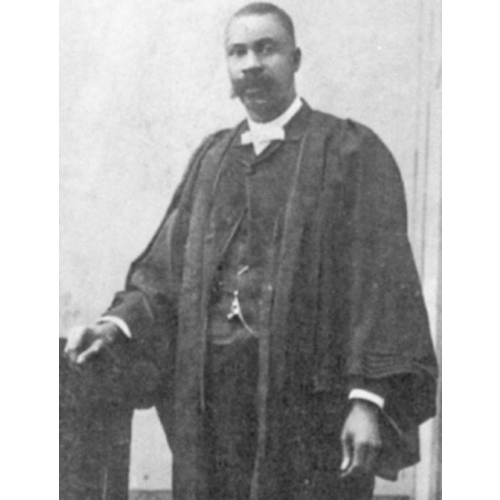
Source: Link
DAVIS, DELOS ROGEST, teacher and lawyer; b. 4 Aug. 1846 in Maryland, son of James Davis and Anne —; m. first 1868 Nancy Jane Mitchell, and they had three sons and four daughters; m. secondly 1907 Mrs Mary Jane Banks; d. 13 April 1915 in Anderdon Township, Ont.
An escaped slave, James Davis came to Upper Canada via the Underground Railroad in 1850; later, with his wife and children, he took up a farm in the black settlement of New Canaan in northern Colchester Township. Delos R. Davis’s early education was directed by Theodosia Lyon at the American Missionary Association school in New Canaan. It closed in 1859 but Davis continued his schooling in the public system until 1863. He then held a number of odd jobs, including work at a paper mill in Michigan and as a hand on a steamer. For four years prior to 1874 he taught in Colchester’s school section 13 (very likely the Gilgal school, which had been established by the African Methodist Episcopal Church).
Davis began to study law in 1871 under the tutelage of two Windsor men, county judge Gordon Watts Leggatt and attorney Charles Robert Horne, and in December of that year he was appointed a commissioner of affidavits, affirmations, and recognizances. On 19 June 1873 he became a notary public. In the Essex County Historical atlas of 1881 he is listed as a farmer, attorney, notary, and real estate and loan agent, living near Gesto in north Colchester. He was unable, however, to find a lawyer willing to allow him to article in his office. Davis’s mpp, William Douglas Balfour*, therefore introduced a special act in 1884 authorizing the Supreme Court of Judicature to admit Davis to practise as a solicitor provided that he passed the test of the Law Society of Upper Canada and paid the standard fee. Davis wrote the examination and was sworn in on 19 May 1885. In 1886 his petition to the legislature to be admitted as a barrister was granted under another special act, again on the condition that he pass the requisite examination. He was called to the bar on 15 Nov. 1886. Although Davis is often believed to have been the first black lawyer in Canada, Robert Sutherland of Walkerton, Ont., and Abraham Beverley Walker* of Saint John had qualified before him.
The way in which Davis became a solicitor and a barrister was unusual, but it was not without precedent in Ontario, where since confederation 27 others had been called to the bar through special statutes. Similar wording in both Davis acts provides insight into the problems he faced. The legislation stated that “in consequence of prejudices against his colour, and because of his being of African descent he had not been articled to any attorney or solicitor.” Apparently, along with the obvious racism, some difficulty had also resulted from his humble background.
Davis established a practice in Amherstburg in 1887, and subsequently took up residence in a small subdivision east of the town; it was here that his first wife would die, in childbirth in 1893. Davis focused on criminal and municipal law, and was counsel in six important murder cases. His specialty, however, in low-lying Essex, was drainage litigation. In 1900–5 he practised in partnership with his son Frederick Homer Alphonso, a graduate of Osgoode Hall in Toronto. (Their relationship may not have been harmonious: after the death of his father, Fred would unsuccessfully contest his will on the grounds that he had been a debilitated alcoholic.) Davis was important locally as a freemason, a member of the Wesleyan Methodist church, and a major player in municipal politics (he had evidently been involved in the formation in 1879 of North Colchester Township).
Following Davis’s retirement in 1909, the provincial government recognized his status within his profession by appointing him kc, on 10 Nov. 1910. About 1913 he suffered a stroke and at some point lost the sight of an eye. He died at his home near Amherstburg in 1915 and was buried in New Canaan, possibly in the African Methodist Episcopal Cemetery, where his parents, first wife, and a daughter were interred. Remarkable for his tenacity and resolve, Davis had done much to expand what was considered to be an acceptable role for blacks in Canada.
AO, F 977, African Methodist Episcopal Cemetery (near Gesto, Ont.), no.10 (mfm.); F 2076; RG 22-310, reg.T: 309–12; RG 22-311, nos.1326 (1893) and 91 (1915); RG 80-8-0-164, no.4887; RG 80-8-0-554, no.11421. Law Soc. of Upper Canada Arch. (Toronto), 1-2 (Convocation, printed minutes), 1884–86; 1-5 (Convocation, rolls), barristers’ roll, 1870–96; D. R. Davis file; F. H. A. Davis file; “Statistical analysis of the record of calls to bar in Upper Canada and Ontario, 1797–1969.” NA, RG 31, C1, 1861, Colchester Township, [Ont.], dist.4: 44; 1871, Colchester Township, div.1: 30. Evening Record (Windsor, Ont.), 14 April 1915. L. W. Bertley, Canada and its people of African descent (Pierrefonds, Que., 1977). Harrow Early Immigrant Research Soc., Harrow and Colchester South, 1792–1992 (Harrow, Ont., 1993). D. G. Hill, The freedom-seekers: blacks in early Canada (Agincourt [North York], Ont., 1981). Julius Isaac, “Delos Rogest Davis,
Cite This Article
Owen Thomas, “DAVIS, DELOS ROGEST,” in Dictionary of Canadian Biography, vol. 14, University of Toronto/Université Laval, 2003–, accessed March 1, 2026, https://www.biographi.ca/en/bio/davis_delos_rogest_14E.html.
The citation above shows the format for footnotes and endnotes according to the Chicago manual of style (16th edition). Information to be used in other citation formats:
| Permalink: | https://www.biographi.ca/en/bio/davis_delos_rogest_14E.html |
| Author of Article: | Owen Thomas |
| Title of Article: | DAVIS, DELOS ROGEST |
| Publication Name: | Dictionary of Canadian Biography, vol. 14 |
| Publisher: | University of Toronto/Université Laval |
| Year of publication: | 1998 |
| Year of revision: | 1998 |
| Access Date: | March 1, 2026 |



